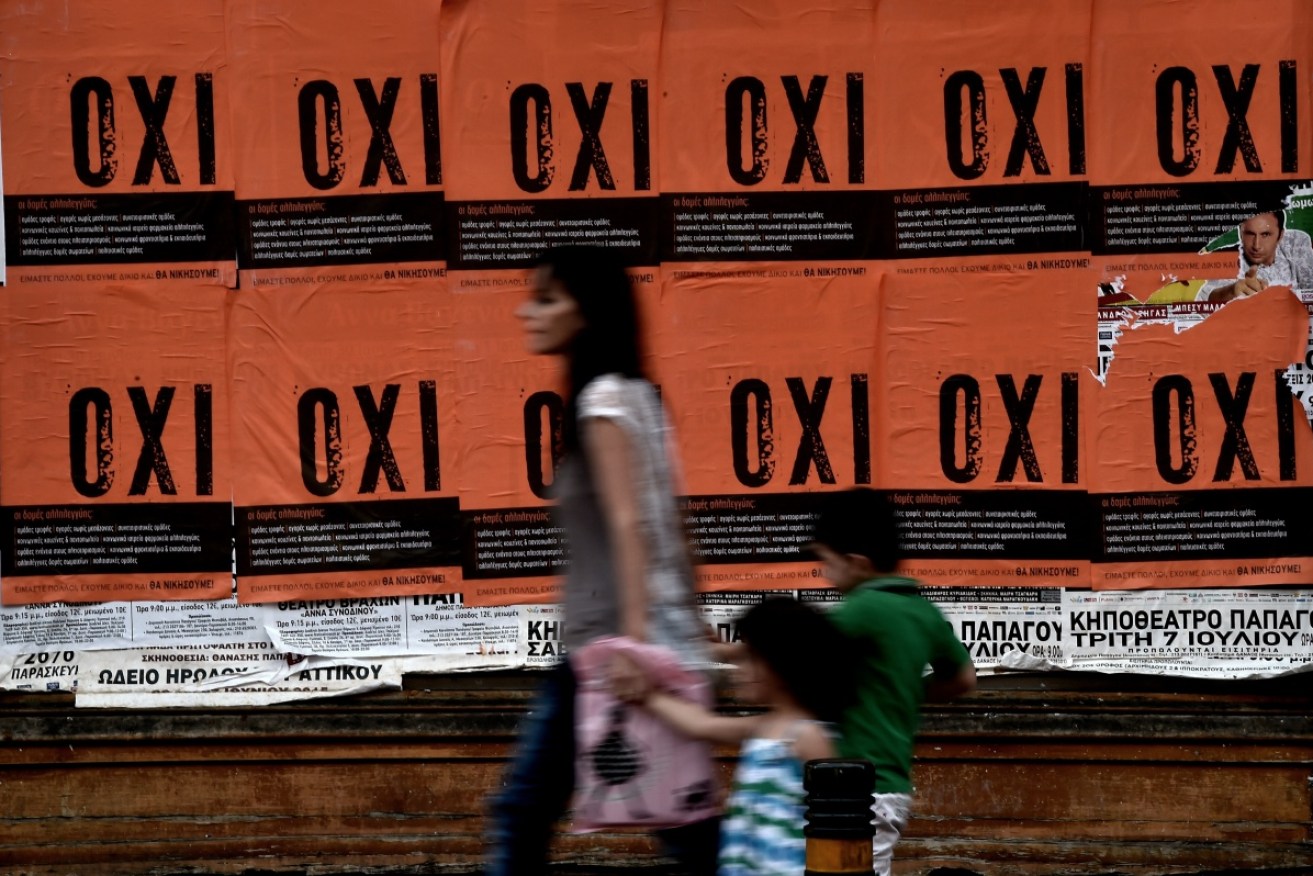Why Putin and Obama are keys to a ‘Greek solution’

Getty
While Western media outlets continue to focus on the dramatic twists and escalations of the debt standoff between the International Monetary Fund and the Greek government, most have missed a big piece of the story.
And it’s got something to do with why supermarkets in Moscow and Beijing are making more shelf space available for ouzo and olive oil.
Wider geo-political interests of the world’s three superpowers – the United States, China and Russia – are likely to play a critical role in the fate of Greece.
• Confusion reign in Greece
• Aussies pay the price for failed Greek bailout
• Confused about Greece? Here’s what it all means
There is no escaping the prospect that an exit from the European Union and its ill-conceived common currency will put Greece on a fast-track out of the NATO Alliance.
The reason is that the two biggest external sources of capital investment in Greece today are the United States’ strategic rivals.
As the crisis has intensified in the past six months, China and Russia have continued to deepen their economic ties with Greece.
It might surprise many readers of Western press reports that economic activity persists in Greece but it does – in a fragmented way – thanks mainly to the deep pockets of China and Russia.
Cosco, a state-owned Chinese company, is investing heavily in the infrastructure of Athens’ port facilities in the Piraeus district.

A woman and her children walk past posters reading ‘NO’ ahead of a referendum. Photo: Getty
Right now, the company is trying to negotiate a deal that would see Cosco take majority ownership of the main port assets.
Gazprom, the Russian government’s energy utility, is poised to spend billions to expand its gas network across the Greek mainland.
Greece already sources natural gas from Gazprom, but also needs capital to tap large reserves of gas in the Aegean Sea.
The bold positions taken by the government of Alexis Tsipras in recent negotiations with the IMF and the European Council cannot be understood outside these evolving geo-political relationships.
Likewise, the hard-line responses of German Chancellor Angela Merkel and IMF chief Christine Lagarde are driven by the same realisation: that the Americans at some stage will have to come to the table with open pockets.
Until that happens, it makes no sense for European governments to take a financial haircut that might provide relief to the Greek people from debt enslavement.
Greek aces – Putin and Obama
Mr Tsipras’ trump card in the debt talks is his nation’s strategic importance to the United States.
There is a long and painful history attached to US foreign policy in Greece that underlines the country’s importance to Washington.

People waited in line to withdraw money from ATMs after Greece closed its banks on June 29. Photo: Getty
Greece was the first theatre of the Cold War in 1947 when President Harry Truman despatched US forces to overpower a communist insurgency that would have locked Greece behind Stalin’s Iron Curtain.
That conflict, known as the Greek Civil War, was an ugly episode that Greeks – especially those that emigrated to places like Australia – have spent the last 70 years trying to forget.
In 1967, American intelligence agencies are alleged to have supported a military coup that shuttered democratic elections for seven years.
Today, the Greek people are conscious of the historical importance that the United States has attached to their nation’s coordinates on the world map.
Mr Tsipras’ daring push for debt concessions is a high-stakes game predicated on an assumption or hope that the US can be baited to intervene again – not with guns or a troika of crank colonels perched on tanks, but great licks of cash.
At some point, the chaotic filibustering of Mr Tsipras and Mrs Merkel may have to be short-circuited by the US showing its strategic hand.
If President Barack Obama stays on the sidelines, the US runs the real risk of watching Greece stumble into Russia’s expanding sphere of influence in Europe.
Can Tsipras survive as PM?
Tsipras’ geo-political plotting might come to nothing, however.
His problem is that he may not be able to hold on as Prime Minister for much longer.
Greece’s privately owned television and print media outlets are generally opposed to the government’s decision in June to reject the IMF’s debt repayment proposal.

Greek Prime Minister Alexis Tsipras met with resistance from creditors. Photo: AAP
They are recommending that Greeks vote “yes” at this weekend’s referendum on whether the government should agree to new austerity measures demanded by the IMF and the EU.
Mr Tsipras, who supports a “no” vote, called the referendum saying that he could not sign up to the new terms because he was elected to get austerity measures watered down.
Opinions polls suggest the vote is likely to be close, with support for the “yes” campaign appearing to strengthen since national banks closed branches in response to emergency capital controls on Monday.
While most Greeks are opposed to further cuts to government pensions and social services, most polls indicate they want the country to stay in the European Union.
If this sentiment drives most to vote “yes”, it would likely lead opposition politicians led by the conservative New Democracy party to bring on a no-confidence motion in the national parliament.
If this happens, Tsipras may be forced to resign and launch a fresh election.
Some Greeks are beginning to worry that the political vacuum fostered by the debt crisis might inspire a few ambitious officers in the Greek armed forces to take matters in another direction.
I’m praying that doesn’t happen.








